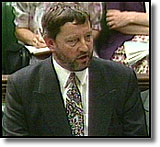
|
Government Accepts Higher Education FeesThe Education Secretary, David Blunkett, has confirmed that undergraduate students are to pay tuition fees.In a Commons statement, Mr Blunkett said all but the poorest families would have to pay up to £1,000 a year -- about a quarter of the average cost of a course. The Education Secretary was responding to publication of the Dearing Report, the most wide-ranging review of higher eduaction for more than thirty years. Mr Blunkett accepted the analysis of Sir Ron Dearing -- a non-political Government advisor -- that more money was needed for higher education. As neither taxpayers nor employers would cough up, graduates would have to. "Students should share both the investment and the advantages gained from higher education," said Mr Blunkett.
But he told MPs the new fees would be covered by a system of loans, which will also cover living costs and replace existing maintenance grants. The changes would inject much needed millions into a university sector creaking at the seams, but would also guarantee continuing access for students from least well-off families. "Our preferred solution secures equity, access, quality and accountability," said Mr Blunkett. It would produce a university system that was "fair, good for students, good for parents, good for the universities, good for business and good for Britain".
|

|
| Dorrell calls it "a smash-and-grab raid" |
Some on the left of the Labour Party are also finding it hard to accept that the Government is ending the principle of free full-time higher education.
MP Ken Livingstone said the Government's proposals were a "kick" to society's poorest, and indicated that he would vote against them, provided MPs were given an opportunity to do so.
He told a meeting at Westminster of the Real Solutions Coalition for State-Funded Education that most Labour MPs had benefited from free education and healthcare, saying: "We owe everything to the welfare state.
"It's not our job to pull the ladder up so that this generation can't partake of those rights as well."
Student leaders have already said they will fight the imposition of fees "tooth and nail". They warn that the new charges are bound to deter many from going to university.
The MSF union, which represents over 15,000 technical, clerical and administrative staff, has also criticised the introduction of tuition fees. It fears the creation of a two-tier university system with the elite institutions charging top-up fees. It has called on the Government to prevent this from happening.
The universities themselves reluctantly accept that students should start paying for their education. Sir Gareth Roberts, the Chairman of the Committee of Vice Chancellors and Principals, told the BBC's Today programme that the report combined vision for the future with realism for the present. His one major concern was the means-test which would be used to determine how much a student would be asked to pay.
Diana, Princess of Wales, 1961-1997
Conference 97
Devolution
The Archive
News |
Issues |
Background |
Parties |
Analysis |
TV/Radio/Web
Interactive |
Forum |
Live |
About This Site
News |
Issues |
Background |
Parties |
Analysis |
TV/Radio/Web
Interactive |
Forum |
Live |
About This Site
© BBC 1997 |
politics97@bbc.co.uk |

